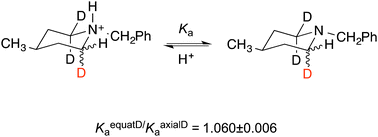We reaffirm our conclusion that secondary deuterium isotope effects on acidity are due to n–σ* delocalization that decreases vibrational frequencies and zero-point energies. We reject an electrostatic or inductive explanation that arises from the anharmonicity of the C–H bond. We address calculated values of atomic charges, dipole moments, and dipole-moment derivatives dμ/dr, and we show the isotope effect to be a stereoelectronic phenomenon arising from harmonic vibrations.

